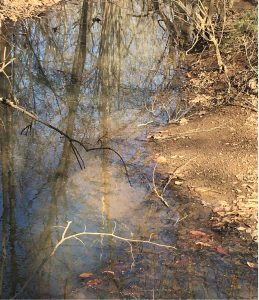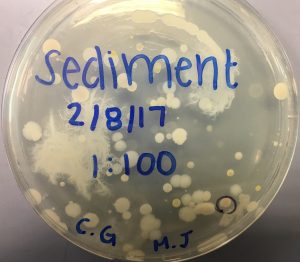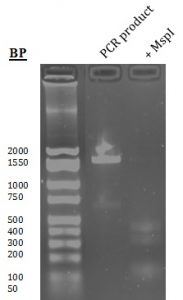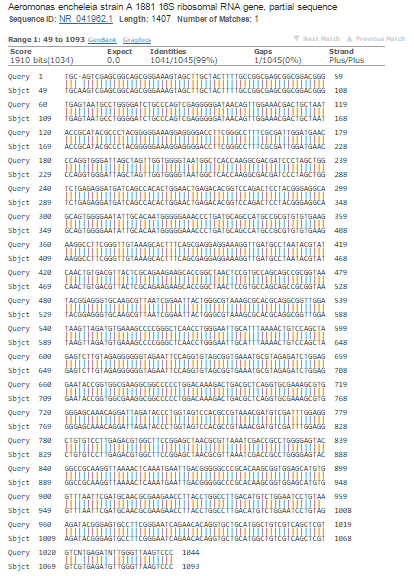Aeromonas echeleia is a gram-negative, anaerobic bacteria that primarily resides in aquatic environments. This species was previously isolated by Novakova and colleagues from unpolluted surface and underground waters in the Czech Republic.
References:
Novakova D, Svec P, Sedlacek I. Characterization of Aeromonas encheleia strains isolated from aquatic environments in the Czech Republic. The Society for Applied Microbiology. [Internet]. 2008; [cited 2017 April 2]; 48: 289-294: Available from http://onlinelibrary.wiley.com/doi/10.1111/j.1472-765X.2008.02528.x/pdf
Date collected: February 8, 2017
Methods for isolation and identification:
- A sterile collection tube was placed at the bottom Buffalo Creek (Figure 1), with the cap on, and kept closed until placed in the bottom of the creek, where it was quickly opened and used to scoop the sediment sample into the tube. Two serial dilutions (1:10 and 1:100) were created; each dilution and non-diluted sample were spread across individual nutrient rich agar plates. The plates were left at room temperature for 48 hours to colonize.
- A bright yellow colony (Figure 2) was selected from the 1:100 diluted plate for 16s rRNA gene sequencing by PCR amplification.
- The PCR product was digested with MspI and sequenced to identify the genus and species of the bacteria.

Figure 1. Site of collection (on Buffalo Creek)

Figure 2. Colony selected for identification
Results:
- MspI digestion (Figure 3): A 1,800 bp product was amplified by PCR. When the product was digested with MspI, three bands were observed at approximately 400 bp, 300 bp, and 100 bp.

Figure 3. Results of PCR amplification and MspI digestion
- Sequence analysis (Figure 4): The sequenced PCR product generated 1045 bases of high-quality reads that were used to identify the genus and species of the colony. The chromatogram of the sequence is available as a pdf (PDF of Sediment Sample). NCBI BLAST analysis revealed 99% identity with bases 49-1093 of the 16s rRNA gene of Aeromonas echeleia.

Figure 4. NCBI BLAST analysis of the sediment bacterial colony
Contributed by: Meagan St. John and Christina Gonzalez, Biology 250 Spring 2017